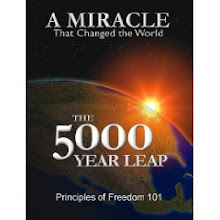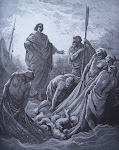We may not understand why pandemics happen or the means by which God’s glory will ultimately be magnified through them. However, I have found people very interested in how God protected the nation of Israel from contagious diseases and sicknesses through many of the commandments given by Moses in the Law. No other nation around them had anything other than superstition, rituals, and often deadly traditions to deal with these things.
God’s law includes regulations concerning cleanliness, health testing (inspections), quarantines, dietary restrictions, covering disease-causing refuse, sexual prohibitions, etc. all of which protected the health of the nation.
Astoundingly these regulations about washing clothes upon which something died or breaking porous pots but putting brass pots in a hot fire and separation from potentially communicable diseases were centuries even millennia before modern science discovered bacteria, germs, and viruses.
These regulations are evidence that our God created the world and knows far more about health and life than man. I am attaching an article that I think will amaze you and maybe others at the wisdom of the all-knowing and eternal God.
Medical Science and the Law of Moses
by Stephen Caesar
This article first appeared in FrontLine Jul/Aug 2000.
A common criticism of the Bible is that it is antiquated and thus no longer relevant to our modern world. Since it was written millennia ago in an unscientific age (the claim goes), it is of no use to us today except as an interesting piece of ancient Semitic mythology. This criticism collapses, however, when one looks closely at the Mosaic Law and its relation to the field of medicine.
While the cultures around him were awash in superstition, Moses left a legacy of unparalleled medical advancement. William R. Vis, M.D., a member of the American Medical Association and the American College of Physicians, states:
As a scientist, Moses rises above all other Biblical characters because of his stupendous knowledge of public health and hygiene. The safeguarding of the people Israel under the difficulties encountered should, perhaps, rank as the greatest achievement in all medical history.1
Dr. Vis uses leprosy as an example of Moses’ unique insight into preventing the spread of disease in ancient times, pointing out that the great lawgiver used techniques unknown to the medical profession until fairly recently:
To show how far Moses was ahead of modern society we need only to remind ourselves that the word quarantine originated in the fourteenth century when the Italian ports of Venice and Genoa first refused admission to immigrants who might be harboring [bubonic] plague and required them to stay on board for forty days—hence the word quarantine. Even in the seventeenth and eighteenth centuries leprosy spread over southern Europe until the principles of Moses were re-enacted successfully. Moses disinfected the patient’s clothing [Lev. 13:47 ff.], bed, and even the house itself [14:34 ff.]. The leper was required to wear a covering (mask) upon his upper lip [13:45]. On occasion, the priest was requested to go outside of the camp to examine the suspect [13:46]—further to protect the populace.2
Dr. Edward Neufeld, Professor of Ancient Cultures at Fairleigh Dickenson University in New Jersey, expanded on this point in the Journal of the History of Medicine and Allied Sciences:
Of great significance is the fact that “purification” techniques involved also the rinsing or burning of the garment of the diseased person, shaving the hair of the head, beard, and even the eyebrows (Lev. 14:8–9) and sterilization by means of fire (Lev. 13:55–58). Thus, in effect, the ways to fight communicable diseases were to destroy the germs, or prevent their being carried to healthy people. This leads us to the conclusion that although germs which directly cause certain infections and diseases were obviously unknown in those days, there was an awareness of the notion that some diseases were caused by the entry into the body of some infective agents.3
Other medical scientists have noticed the Pentateuch’s astoundingly modern outlook on health and hygiene. D. H. Trapnell, M.D., Consultant Radiologist at Westminster Hospital in London, observed:
One respect in which Jewish medicine was better than that of contemporary peoples was the remarkable sanitary code of the Israelites in Moses’ time. … The Jews, as a nation, might not have survived their time in the wilderness, or the many other vicissitudes through which they passed, without their sanitary “code.” It deals with public hygiene, water supply, sewage disposal, inspection and selection of food, and control of infectious disease. The most interesting thing about it is that it implies a knowledge which in the circumstances of the Exodus and the wilderness wanderings they could scarcely have discovered for themselves, e.g. the prohibition, as food, of pigs and of animals which had died natural deaths [Lev. 7:24], the burial or burning of excreta [Deut. 23:13, Ex. 29:14], etc., and the contagious nature of some diseases. … In a number of respects the biblical outlook on the sick, and on health in general, has a bearing on modern medical practice, and is perhaps more up-to-date than is generally realized.4
Another physician who saw modern medical science in the Law of Moses was the late A. Rendle-Short, M.D., professor of surgery and lecturer in physiology at the University of Bristol in England, as well as Examiner and Hunterian Professor of the Royal College of Surgeons. Commenting on Deuteronomy 14:21, which prohibits eating the meat of an animal which has died of disease, Dr. Short observed;
Today, if a butcher exposed an animal which had died of disease for sale in his shop he would be prosecuted under the Food and Drugs Act, because there is the possibility of conveying some germ infection or parasite. The law is the more noteworthy because thereby a considerable source of food supply is cast away as useless. Whence had the Biblical writer this insight, two or three thousand years in advance of his day?5
Regarding Leviticus 11:32–38, which underscores the necessity of clean water for hygienic purposes, he noted:
The importance of a clean water supply is one of the major discoveries of the modern public health services. It was only about fifty years ago [Dr. Short was writing in 1949] that it became recognized that typhoid fever in this country [Great Britain], cholera in India, bilharziasis in Egypt, and many other diseases, were spread principally by polluted water.6
The late physician further wrote:
Closely connected with the protection of the wells and springs is the safe disposal of sewage. Water-borne and fly-borne diseases, such as dysentery and enteric fever, have been the scourge of armies in the field even more than of stationary populations. In the South African [Boer] War the loss of life from these diseases was greater than from wounds. It was not till the Great War of 1914–1918 that effectual precautions were put into practice. Yet all through the centuries the remedy was ready to hand, if the generals had troubled to read their Bibles, and to observe the directions given for the disposal of excreta by burial (Deut. xxiii. 12–14).7
The Mosaic Law not only stressed protection of water from contamination, but food as well. Commenting on Numbers 19:15, which declares unclean any food container not sealed with a tight lid, Prof. Neufeld stated that
some care was taken to protect the food being prepared from surrounding contamination. Textual references to “open vessels” with no lids fastened down clearly indicate that pots with fastened-down lids were used during preparation and storage to protect food from insects and various contamination. In fact, an ingeniously constructed lid of the middle 8th century B.C. was unearthed by [Yigael] Yadin at Hazor.8
These facts are more than interesting in themselves; they also stand in marked contrast to the medical “science” of the pagan Egyptian milieu out of which Moses and the Israelites emerged. Without divine inspiration, the Egyptian-influenced author of the Pentateuch would have absorbed—or at least been heavily influenced by—the unscientific beliefs about medicine and health care held by the Egyptians. This, however, is not the case. The great archaeologist Dr. William F. Albright, late professor of Semitic Languages at the Johns Hopkins University and former Director of the American School of Oriental Research in Jerusalem, pointed out, “it is clear that the religion of Israel revolted against virtually every external aspect of Egyptian religion, including the complex and grotesque iconography, [and] the dominion of daily life in the Nineteenth Dynasty by magic.”9
Prof. Neufeld similarly noted that the Pentateuch’s laws on purification and disease prevention do not reflect the beliefs of the cultures that surrounded Moses:
They presuppose a fairly well-developed system of hygiene. None of the known rituals of the ancient Near East, as illustrated in mythological texts, incantations, and descriptions of festivals, can be compared to the vast scope of detailed topics, extent of knowledge, systematic elaboration, and clear identification of spiritual “purity” with community responsibility, as exemplified in the textual materials of the Bible.10
Dr. M. R. DeHaan, who received his M.D. from the University of Illinois Medical School and was a practicing physician for many years before becoming an evangelical preacher, expands on this central point:
Ask the question, since Moses was educated in all these [Egyptian] superstitions and primitive practices, how does it happen that he does not teach or recommend these remedies in his writings? Although he deals in detail and great length with diseases, the treatment of infections, leprosy, and running sores, yet the illusions, deceptions, gross errors, and superstitions concerning anatomy, physiology, pathology, and treatment of diseases as taught in the highest schools of learning in Egypt from which Moses was a graduate [Acts 7:22], are never taught or even suggested in the books of Moses. But instead the instructions Moses laid down for Israel were utterly at variance with the accepted practices of that day, and fully in harmony with modern-day scientific facts.11
Dr. Short similarly remarked:
It is not to be expected on ordinary grounds that a small secluded nation like the Hebrews, lately come out of the desert, would have any better ideas of health and disease than were current amongst a great settled civilization like that of Egypt. It is the more surprising, therefore, to find in the Old Testament the observations of disease so accurate, and the sanitary science so much in accord with modern knowledge.12
Given such advanced knowledge on the part of Moses (in contrast to the unscientific ignorance around him), Dr. Vis makes the following statement:
The medical knowledge imparted by Moses to the people of Israel stands out as a solitary scientific mountain peak above the barren centuries which had gone before and the period of darkness which followed. … Moses, then, should be ranked not only with the great law-givers of history but also with the very great names in sanitary science. In safeguarding Israel from pestilence and communicable diseases he was the first and greatest of hygienists.13
These facts go far in demonstrating that the Bible is not of mere human origin. If it were, the commands regarding health and hygiene found in the Mosaic Law would have been tainted by the biases, prejudices, and presuppositions of its author, who was born and raised in an era of pre-scientific ignorance and superstition. Whether the Pentateuch was a product of a man fleeing Egypt or of Jewish priests in exile in Babylon (as critics claim), the scientific facts it contains regarding health and medicine are so advanced and so completely unstained by pagan superstition and unscientific error that only a single conclusion can be reached about its origin—divine inspiration. Dr. Short commented that the medical principles in Moses’ writings
are so free from paganism or magic, are so simple, so scientific, so neglected for centuries only to be rediscovered within our own lifetime, so little likely to be due to the observation of a people as primitive as the Israelites, a thousand or fifteen hundred years before Christ, that we must surely conclude that the writers had a special revelation from God.14
Another titan in the field of modern medicine, the late Dr. Howard A. Kelly, concurred heartily. Dr. Kelly received his M.D. from the University of Pennsylvania (an Ivy League school) and served as associate professor of obstetrics at that same institution. He later became chairman of gynecological surgery at the Johns Hopkins Hospital and Medical School, and finally Emeritus Professor of Gynecological Surgery at that prestigious institution. He closed his extremely productive life as chief surgeon and radiologist at Howard A. Kelly Hospital in Baltimore, as well as the author of countless papers on medical science, particularly obstetrics and gynecology. This intellectual and medical giant once wrote:
I am sure that the Bible is the Word of God, with an assurance greater than all other convictions directing my course in this brief earthly pilgrimage. Above all those maxims regulating the practical relations of life born of experience, above those logical deductions from philosophical and scientific premises, I place the clear light of truth shining from the pages of the Bible. The Bible, the Word of God, is my one great guerdon on my homeward journey. … The Bible appeals to me strongly as a physician, because it is such excellent medicine; it has never yet failed to cure a single patient if only he took his prescription honestly. Whatever there is in civilization that is worth while rests on the Bible’s precepts. … Everywhere and in all its teachings the Bible claims to be the authoritative Word of God, and as such, I accept it.15
At the time of the original publication, Stephen Caesar was pursuing his master’s degree in anthropology/archaeology at Harvard University.
- William R. Vis, M.D., “Medical Science and the Bible,” in Modern Science and Christian Faith, 2nd ed. (Wheaton, IL: Van Kampen Press, 1950), 238. [↩]
- Ibid., 244. [italics original] [↩]
- Edward Neufeld, “Hygiene Conditions in Ancient Israel (Iron Age),” Journal of the History of Medicine and Allied Sciences 25 (1970); reprinted in The Biblical Archaeologist Reader IV, Edward Campbell and David Freedman, eds. (Sheffield, England: The Almond Press, 1983), 171. [↩]
- New Bible Dictionary, 3rd ed. (Leicester, England: Inter-Varsity Press, 1996), s.v. “Health, Disease and Healing.” [↩]
- A. Rendle Short, M.D., Modern Discovery and the Bible, 2nd ed., rev. (London: Inter-varsity Fellowship, 1949), 120. [↩]
- Ibid. [↩]
- Ibid., 121. [↩]
- Neufeld, op. cit., 162. [↩]
- William F. Albright, From the Stone Age to Christianity, 2nd ed. (Garden City, NY: Doubleday Anchor Books, 1957), 270. [↩]
- Neufeld, op. cit., 172. [↩]
- M. R. DeHaan, M.D., Genesis and Evolution (Grand Rapids, MI: Zondervan, 1962), 61. [↩]
- Short, op. cit., 119. [↩]
- Vis, op. cit., 249. [↩]
- Short, op. cit., 123. [↩]
- Howard A. Kelly, M.D., A Scientific Man and the Bible (Philadelphia: Sunday School Times Co., 1925), pp. 41, 54, 61. [↩]
Rom. 10:2-4

















































